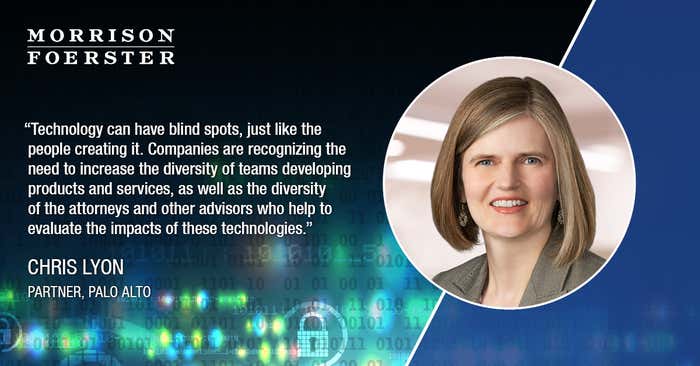
Chris Lyon is a partner in MoFo’s Palo Alto office. Her practice focuses on helping companies develop privacy and data protection strategies for their products and services, including some of the most cutting-edge technology offerings and developments.
Chris advises some of the top Silicon Valley-based companies on how to best leverage their data while also remaining compliant with ever-evolving privacy and data protection laws. Her clients span a variety of industries, from technology service providers and hardware/software giants to pharmaceutical, biotechnology, and consumer product companies.
She has particularly extensive experience advising technology companies on building privacy protections into cutting-edge offerings, including connected products and services (Internet of Things), artificial intelligence (AI) and data analytics, and cloud-based services, as well as on managing the related “Big Data” implications.
In addition to her regular practice, Chris frequently writes and speaks on topics where privacy and technology intersect, and has won the Burton Award for Distinguished Legal Writing.
What was it that initially drew you to Privacy + Data Security law?
I was initially drawn to privacy law because I had a wonderful mentor, Miriam Wugmeister, who was building our privacy practice and I wanted to work with her more. When I first volunteered, I wasn’t even quite sure what privacy work involved. (This was back in the early 2000s, long before many of the privacy laws we know so well today.) I quickly grew to appreciate the real-world impact that we can have as privacy lawyers, and I love working with clients to help them develop their products, services, and systems in a privacy-focused way that fosters the trust of their customers and employees.
Is there any evidence that you’ve seen indicating that diversity and inclusion is becoming more of a priority in your practice group, or suggestions on how it can do so in the future?
Diversity is an important priority within the privacy practice, and within the privacy profession as a whole. As privacy lawyers, our job includes considering ethics and fairness, not just whether a data processing activity expressly violates the letter of the law. Increasingly, privacy laws and regulators require companies to evaluate whether their data processing activities (such as tools using artificial intelligence, machine learning, or profiling) may result in unlawful discrimination, or perpetuate existing social inequalities. Technology can have blind spots, just like the people creating it. Companies are recognizing the need to increase the diversity of teams developing products and services, as well as the diversity of the attorneys and other advisors who help to evaluate the impacts of these technologies.
Can you speak to the importance of mentorship in your career, or perhaps why you are driven to mentor others?
I’ve had amazing mentors throughout my career, and I still do. In my view, you never become so senior or s experienced that you cease to need or benefit from mentorship. There are always people to learn from, who can help you progress in your practice and career. As I mentioned, Miriam Wugmeister has been an important mentor throughout my career at the firm, from when I was a junior associate through making partner, and continuing strong today. As I’ve become a mentor to others myself over the years, I’ve learned what a great feeling it is to help others progress in their careers, and how we all benefit from the growth and success of each other.
Learn more about MoFo’s commitment to the recruitment, retention, and advancement of diverse and women attorneys here.